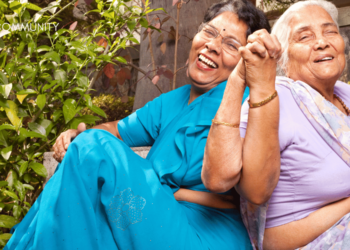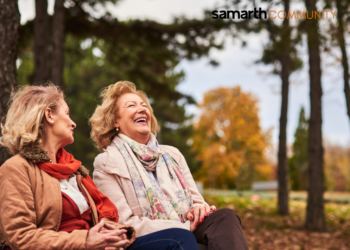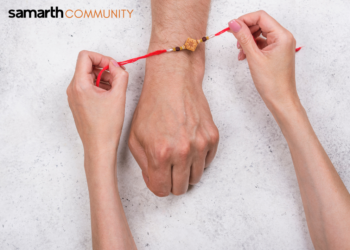It’s not in adding years to your life but in adding life to your years. If you go by what research says, it seems the best way to do it is by building healthy relationships. Scholars have found that people with strong social ties live longer! Of course, it could be that it’s all interconnected. For example, if you are social, you are less stressed and in better mental and physical health and live longer. If you are isolated, you are more likely to be depressed and less active, causing health issues affecting your mortality.
It is the UN Decade of Healthy Ageing (2021–2030), and much is happening around it to ensure people age healthily. A recent study focussed on identifying determinants for healthy ageing, and the conclusions were:

Join Now >
- Community engagement
- Independence
- Life-long learning
- Physical activity
- Diet
- Self-awareness
- Outlook/attitude
- Faith
- Social support
- Financial security
You might have noticed that at Samarth, we have recently touched upon all these topics to create awareness. They all are interlinked, and relationships come under community engagement and social support. If you are socially connected, you keep learning, become independent, partake in physical activities, and your outlook will change.
Every input we get about healthy ageing points towards building strong social relationships. Social is not social media. Nevertheless, it can help us find and connect with people.
There is science behind it!
What if we tell you that all this is not just Gyan but is backed by science? In his book Timeless: Nature’s Formula for Health and Longevity, Louis Cozolino, an American psychologist and professor of psychology at Pepperdine University, makes an interesting point on how our brain is wired for social connections. According to him, social connections are good for our brains. More so during our old age. He found that most centenarians were extroverts with high morale and close ties to people around them.
Many studies have established that people with rich social connections have better mental, cardiovascular and cognitive health. One study also found that such people lived longer even if they had habits of drinking and smoking. Another detailed study found a connection between positive emotions and healthy ageing and lower incidences of dementia.
What can you do?
We understand from these inputs that we should focus on building some good relationships as they are highly beneficial to our health and longevity. Family, friend circles, neighbours, colleagues, community, hobby clubs, etc., are great ways to build these relationships. Of course, in the times of social media, you might have to spare time to nurture a few good ones out of it as well.
Some tips:
- Keep in touch throughout, and call and meet periodically.
- If you get invites from people for events or functions, attend more than refuse. It shows you care and helps build a connection.
- Seek people and rekindle old relationships, if possible, to expand your network.
- If someone is in trouble, ask if there is anything you can do and try to help.
- Find occasions to invite people for a gathering or meet at mutually convenient places for an outing or a holiday.
Being a part of communities like Samarth is a great way to go about healthy ageing. You can partake in many events, be aware of happenings, find entertainment, travel together, and much more. Maybe you can read Louis Cozolino’s book to know and believe you are up for a few new tricks even in your old age. Remember, anything is possible if you believe. Here’s to healthy ageing!









